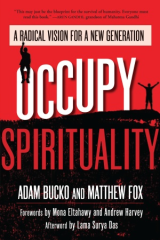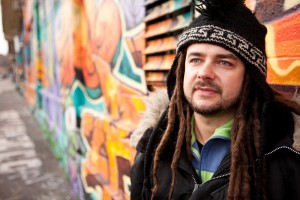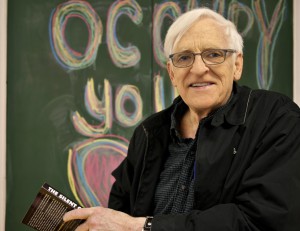Friday
Featured StoriesOccupy Spirituality
 A Radical Vision for a New Generation
A Radical Vision for a New Generation
by Adam Bucko and Mathew Fox
interview by Amanda Hester, Shambhala Times Regional Correspondent
Amanda: I was struck by your description of “spiritual warriorship”. This is particularly resonant with Shambhala.
Matthew: It is nice to hear a woman respond to that language. Because it is not just about male warrior-hood, it is about the strength in all of us, how the demands of our time are calling us forward, beyond just inner peace. Warriorship takes you into the chaos, into the conflicts and confusion. It is about focussing and committing. It is about tapping into the ‘Sacred Masculine’. It is the strength in spirituality, which is not only needed, but is also what we admire in people like Dorothy Day, or Ghandi. They stay true to their values. That is warriorship: developing an inner light that can deal with pain, suffering, and doubt.
Adam: We began working with this metaphor on our retreats with homeless youth. It was particularly powerful for our kids, because of their life stories, their longings and their heartbreak. The notion of warriorship allows them to look at their life differently, to relate to their heartbreak, to work through it and claim the lessons and gifts that come from that suffering. The metaphor allows them to look at everything they’ve experienced and answer the confusion, be kind to it, and clarity emerges out of that. Then they can move forward in a way that is very powerful. That really honors who they are in the world without apologizing for it.
Amanda: You describe the need for a re-emergence of the feminine, the wisdom principle, and the importance of household and community.
Adam: This is about the distinction between contemplation and action. We had a retreat for young contemplatives from different traditions, and some elders were invited. But the elders wanted to make this distinction between contemplation and action. They believed that the goal of spiritual life was off in a cave somewhere, that you somehow heal the world through your vibrations. For young people this doesn’t make sense, spirituality that doesn’t include action isn’t spirituality at all. The “new spirituality” is integrated; it includes all aspects of life. It acknowledges that it is possible to act in the world so that your actions become contemplation.Amanda: I support the intention behind activism, but find a lot of arrogance, aggression, and dualism in it. I am interested in your description of a more spiritually grounded activism. How can we engage that wisdom element to transform the system of aggression through a new paradigm of gentleness?
Matt: The shadow side of activism is that it can turn into further conflict. The question is profound: is there a way to move into a broader circle, where everyone is included? The practice of meditation and deep listening is something that we need to bring to the struggle. It is important not to turn things into us vs. them, and that’s tricky, because you still have to designate what your differences are. But it is about making a distinction between people’s positions, roles, or ideologies, and the person themselves. It is about people’s hearts and the wisdom that is latent inside all of us. It is about putting things into context, and helping people get out of their denial. We need to ask whether the roles we are playing are authentic to our values and to the wisdom within us, or not.
Adam: What I’m interested in is the shadow of the contemplative. The contemplative community needs the activist community, and vice versa. We need to gather both and develop tools to meet at a heart level, to figure out how to move forward in a balanced way. What is encouraging about the Occupy movement is that it didn’t start with ideology, it started with a profound faith that when people gathered together and spoke to each other at a heart level, that something could emerge out of that conversation, just being with each other, and through that we could discover a new direction.
Amanda: Can you speak to the youth culture that is tied into a system of materialism, ignorance, and self-absorption, the majority of youth who aren’t necessarily homeless, but are spiritually homeless?
Adam: Kids come to our centre and say they want to be famous. But it turns out this actually means that they want a life of meaning, purpose, and significance. It’s just that the only theology they have is reality-tv. Those are the gods, the ways to satisfy their longings. Our religious institutions aren’t able to diagnose this as being a spiritual statement. But a lot of what kids say is just expressing this longing, their need for some kind of deeper meaning. As spiritual institutions, or people, we have to re-evaluate what we have to offer, and try to connect that to the longings of this generation. We need elders who are willing to take off their masks and just be there as real human beings, with their aspirations, heartbreak, and everything else. When you relate to young people that way, they respond very well.
Matt: The young are born into a world that exploits them. This is why spirituality is so important. It is a quest for the truth. It invites young people to think for themselves, to follow their own path. Until something happens, a breakdown or a break-through of some kind, the young are often on someone else’s path. They are born as an original blessing, but they are born into a world that is distorted.
Amanda: You use “Occupy Generation” as a metanarrative to describe the movements from Cairo and Tunisia, to New York. The underlying message of spiritual democracy is extremely import. But isn’t it problematic, to codify that with a term so connected to white middle-class America?
Adam: The kids I know who were occupying are actually homeless. In Occupy Istanbul, there was a community of homeless kids who were living there protesting. They were very similar to the kids I work with in New York. In the beginning, the kids who started Occupy were very clear that their inspiration came from what was happening in Tunisia and Egypt. The impulse those young people experienced, and the impulse felt by young people in America, these were very similar kinds of experiences. Revolutions get hijacked. But it doesn’t mean that the original impulse that enables people to stand up for truth and justice isn’t important.
Matt: It begins with moral intuition about injustice. This is what made the young people so brave in Cairo and Tunisia, but also in New York. Occupy didn’t come from America but from North Africa. Ultimately it comes from this intuition of conscience, and this is happening all over the world. Young people are waking up to the fact that they have been born into a system that is hostile to their potential for growth and development. These young people are committed to values that are beyond class or nation. That’s where the fire is.Adam: But they do need help, they need spiritual resources. It is so easy to resort to violence when your family is killed. That is why spiritual communities really need to commit to teaching the deep spiritual practices of nonviolence, contemplation, creativity, and others. We need to embody our spirituality. We need to get our hands dirty.
~~
To see more information about the work of Adam and Matthew, please click here.



















Sep 28, 2013
Reply
Dunno….non-duality-aka previous post? Better still to just be in the world ….a very timely book from Fox and Bucko…and points to the future for me re religious discourse and practice in the world….this kind of thing happening all over the planet and is without boundaries now…..we are really going into some kind of different age re practice. Will get my library to get the book….interesting….
Sep 27, 2013
Reply
I checked out some of the articles on Matthew Fox’s web site. For anyone interested in another, perhaps more philosophical discussion of Christian based spirituality, I recommend an interesting book by Eastern Orthodox scholar David Bentley Hart called “The Experience of God: Being, Consciousness and Bliss. Some of his arguments are identical to those used in the Buddhist philosophical tradition. However its seems to me that neither Hart nor Fox are quite able get all the way to non-duality. Happy reading.